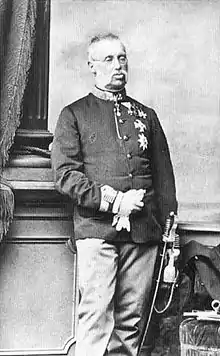The Archduke Albrecht March (German: "Erzherzog-Albrecht-Marsch") is an Austro-Hungarian military march, composed by Karel Komzák II (also known as Karl Komzák[1]) as his opus 136.[2] It was named in honour of Archduke Albrecht, Duke of Teschen (1817–1895).
The march was used extensively by the German forces in World War I and World War II, especially during the departures and arrivals of U-boats. The march is also used by the Chilean Navy during military parades or marches.
- Introduction

In popular culture
- The march is played during departure from, and return to, La Rochelle in the film Das Boot, shortly before the U-96 is bombed at port.
- The march is played in the film The Miracle of Bern when a train of released German prisoners of war arrives at Essen.
References
This article is issued from Wikipedia. The text is licensed under Creative Commons - Attribution - Sharealike. Additional terms may apply for the media files.
